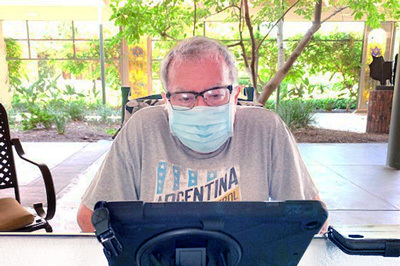At the Jewish Home, Friendships that Bridge Distance and Span Generations


At the Jewish Home, Friendships that Bridge Distance and Span Generations
As any gardener knows, seeds can take root and thrive even under the most challenging conditions. Although the coronavirus pandemic has made socializing extremely difficult for Jewish Home residents, many have nurtured robust new friendships thanks to an innovative partnership between the Home and Builders of Jewish Education (BJE), an L.A.-based nonprofit that facilitates Jewish educational experiences from early childhood through high school.
Earlier this summer, BJE Experiential Educator Michal Kress reached out to the Home about a potential month-long partnership focused on connecting Jewish teens and Jewish Home residents. The idea was simple: teens and seniors, both stuck at home with few outlets for socializing, could meet over Zoom and get to know one another. The result would be strong intergenerational relationships that fostered Jewish continuity and enriched all the participants' lives.

Stacy Orbach, director of volunteer services at the Jewish Home, was enthusiastic about the program from the get-go. "Our residents have been lonely during the pandemic, and this presented such a wonderful opportunity for them to bond with people in the community," she says. "It also enabled residents to share their knowledge with teens – to pass on the wisdom they've accumulated throughout the course of their lives."
The program paired eight Jewish Home residents with 15 teens from high schools across the city including De Toledo, Milken, Shalhevet, Cleveland and Notre Dame. During weekly Zoom chats lasting between 30 minutes and an hour, the residents and teens learned about each other, swapped stories, and even studied together. "One of the residents who participated was a Spanish teacher, and he started teaching the kids Spanish on his Zoom!" Orbach says.
In addition to the Zoom calls, the teens also attended workshops to talk about what their time with the residents had taught them. The goal, says BJE's Kress, was to focus on the Jewish value of "lizkor" (to remember). "We asked the teens to think about what the Jewish Home residents want their legacy to be for future generations."
At the end of the program, the teens wrote reflections about their experiences. "Over the past few weeks, I have learned not to take any moment for granted and to be thankful for the opportunities that come my way," wrote one student. "My partner showed me that, even through this very difficult time for all of us, we must be grateful because we are fortunate to be healthy and safe."
Residents who participated used iPads donated by Jewish Home supporters, who purchased the equipment precisely so seniors at the Home could stay linked to the outside world. "The past months have been hard on our residents, and things like having ‘face-to-face' conversations can make such a difference," says Corey Slavin, the Home's vice president of community engagement. "With the iPads, our donors are helping residents stay happy, healthy, and optimistic about the future."
Although summer has come to a close and the new academic year has begun, a number of the students plan to stay in touch with their new Jewish Home friends even as they balance schoolwork and other activities. "We had to say our official ‘goodbyes' before the kids returned to their classes," Orbach says, "but I've heard from a number of participants in the program that these friendships were built to last!"
For more information about exploring partnerships like this with the Jewish Home, contact Stacy Orbach at (818) 774-3219 or [email protected].